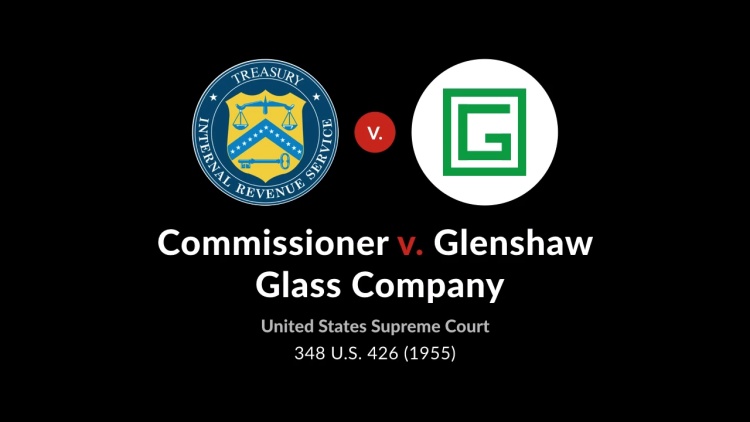Commissioner v. Glenshaw Glass Co.
United States Supreme Court
348 U.S. 426 (1955)

- Written by Sara Rhee, JD
Facts
This case concerns punitive damages collected by two companies, Glenshaw Glass Co. (Glenshaw) and William Goldman Theatres, Inc. (Goldman Theatres) (defendants). Glenshaw was involved in a suit against a manufacturing company, in which Glenshaw requested exemplary damages for the defendant’s alleged fraud and treble damages for injury to Glenshaw’s business. In 1947, the parties settled and Glenshaw received $324,529.94 in punitive damages. Glenshaw did not include the punitive damages in its income tax return for that year. The Commissioner found that Glenshaw owed tax on the punitive damages. The Tax Court disagreed, stating that punitive damages were not taxable. Goldman Theatres similarly received punitive damages when it won an action for federal antitrust violations committed by Loew’s, Inc. The trial court found that Goldman Theatres had sustained $125,000 in loss of profits and awarded $375,000 in treble damages. Goldman Theatre reported $125,000 of the award as gross income for that year, believing that the punitive two-thirds of the award were not subject to taxation. The Tax Court agreed. The Court of Appeals for the Third Circuit consolidated the two cases and affirmed the Tax Court’s decisions. The Supreme Court granted certiorari.
Rule of Law
Issue
Holding and Reasoning (Warren, C.J.)
What to do next…
Here's why 907,000 law students have relied on our case briefs:
- Written by law professors and practitioners, not other law students. 47,100 briefs, keyed to 996 casebooks. Top-notch customer support.
- The right amount of information, includes the facts, issues, rule of law, holding and reasoning, and any concurrences and dissents.
- Access in your classes, works on your mobile and tablet. Massive library of related video lessons and high quality multiple-choice questions.
- Easy to use, uniform format for every case brief. Written in plain English, not in legalese. Our briefs summarize and simplify; they don’t just repeat the court’s language.





